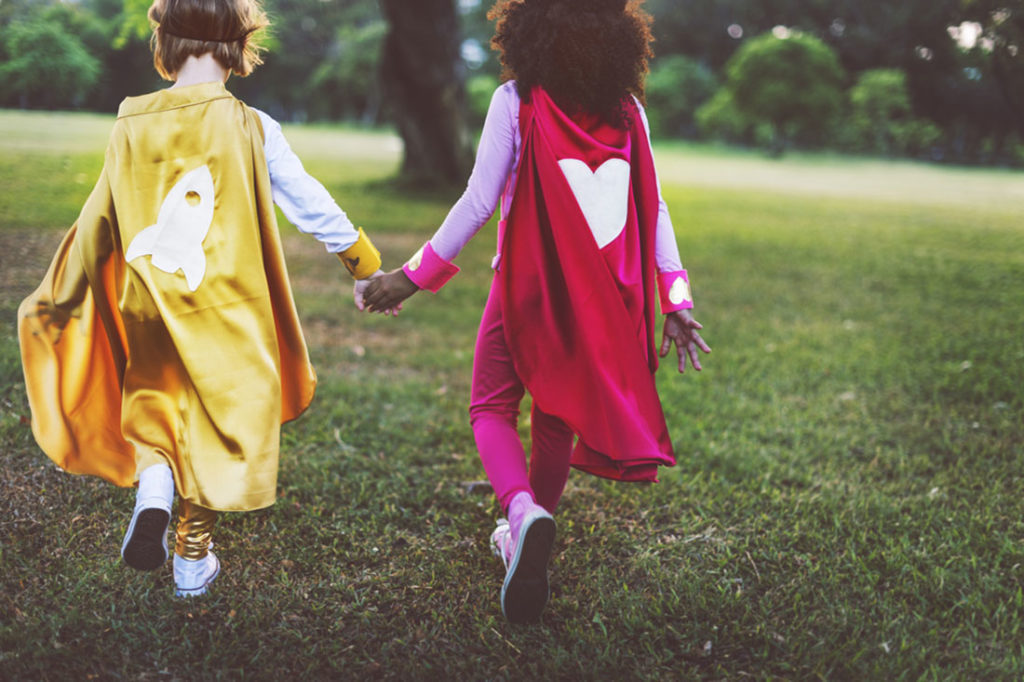“We’ve been through a lot together and we’ve always had each other’s backs. You stayed friends with me when I had like 10 guinea pigs, and I stayed friends with you when you listened to Creed,” she says, to uproarious laughter.
“Jamie, you’re my best friend. You’re like a sister to me. I couldn’t be happier standing here with you today. I remember when we were kids, we always said if we ever got married we’d be each other’s maids of honor, and I’m so happy to be here with you today.”
Related: 8 Traits of Healthy Relationships
***
Now 29 years old, I have had the same best friend, Morino, since I was 5. She has been there for me, and I for her, through all of life’s ups and downs—engagements and weddings, deaths and divorces. We have remained friends across different states and cities, always finding a way to stay connected no matter where we are. After 10 years apart, we’re now lucky to both call Chicago home.
When I got accepted into my dream college, Morino shared in my joy. And when she finally got her first dog after decades of yearning for one, I shared in hers.
When I found out my grandmother died, Morino was able to comfort me in ways others could not. After all, she’d known my grandma for 25 years and was familiar with our close relationship.
When a restaurant served me an immense amount of gluten by accident, she shared in my anger. She’d been there when I got diagnosed with celiac disease as a teenager, and she knew how sick accidentally eating gluten makes me.
I have friends who I met at work, in college and in high school, and although these friendships are ones I cherish, they’re different. Having 25 years of history lends a sturdiness and backbone to a friendship, holding it in place no matter what threatens to tear it down.
It turns out the effects of having a childhood best friend are meaningful and well studied. Having a best friend helps children be well adjusted, happier and more resilient. These benefits extend well into one’s adult life, as children who were isolated are more likely to have health issues as adults.
There is ample research on the psychological benefits of having just one best friend in childhood. One study published in the British Journal of Psychology had over 400 adolescents ages 11 to 19 self-report things like the quality of their friendships, their psychological resilience (or ability to cope during trying times), and their social support system. These children were from the U.K. and came from socioeconomically vulnerable (or low-income) households.
The study authors found a positive and significant correlation between adolescents’ self-reported friendship quality and resilience. “We suggest that individual close friendships are an important potential protective mechanism accessible to most adolescents,” the study authors wrote.
And just one close friendship is enough for a child to have increased resilience and better coping mechanisms. “We suggest that at least one close friendship helps adolescents craft meaning and strength amid substantial adversity,” they concluded.
***
Growing up, my social circle was quite small. I had a handful of wonderful friends I could count on no matter what, but I wasn’t “popular” by any means. I never went to prom. I wasn’t invited to high school parties. I didn’t attend basketball or football games. But despite this, I never once felt lonely—likely because I had one best friend and a few very close friends I knew I could always count on.
The impact of loneliness on our well-being has been documented heavily in the past few years. Loneliness causes a host of problems, both physically and mentally, in children and adults. In fact, one 2018 survey conducted by Cigna suggested that loneliness has the same impact on one’s mortality as smoking 15 cigarettes each day.
Some research has been done on the long-lasting negative impact of being lonely as a child. It turns out the positive effects of having a best friend in childhood extend into adulthood.
One study published in the journal Archives of Pediatrics and Adolescent Medicine looked at children who were socially isolated 20 years later. The study authors were testing the hypothesis that children who are socially isolated have poorer health as adults. Once study participants reached 26 years old, they measured their cardiovascular multifactorial risk status, which takes into consideration a person’s weight, blood pressure, cholesterol and a handful of other risk factors that contribute to one’s cardiovascular health.
The results were quite staggering. Researchers found that socially isolated children were at a significantly higher risk of poor adult health than their non-isolated counterparts. “The need to belong is a fundamental human motivation that, when thwarted, compromises psychological and physical health,” the authors concluded.
***
The past year or so of my life has been riddled with challenges. I got laid off from my job. I had unexpected shoulder surgery that required five months of recovery. My grandmother, whom I was very close to, died. And I learned my parents were getting divorced.
Second to my husband, Morino was my best support system through all of these life experiences. The minute something traumatic or bad or just frustrating happened, I’d call or text her, and we’d be chatting in no time. I only have one brother. Although we are close and I love him dearly, Morino fills the unique role I imagine a sister would have in my life.
Being friends with someone for 25 years makes them as close as family. They know your past as well as family, and can help you cope with any struggle that comes your way. But the relationship can be even stronger than family. After all, it’s someone you choose to have in your life.



